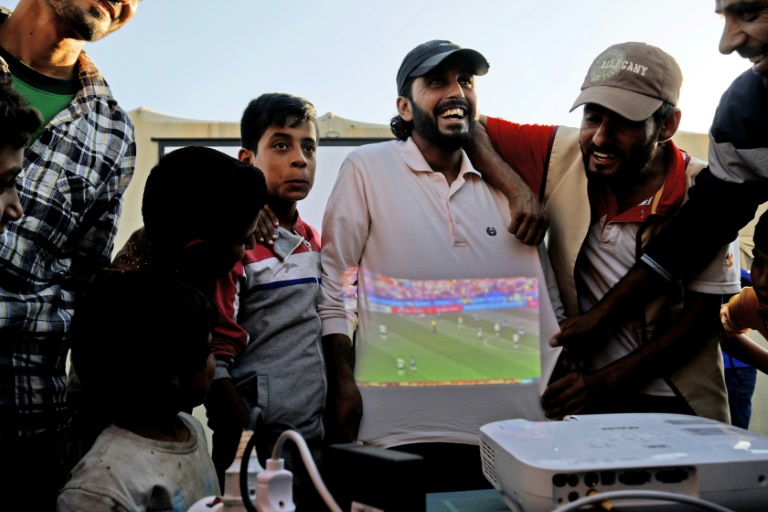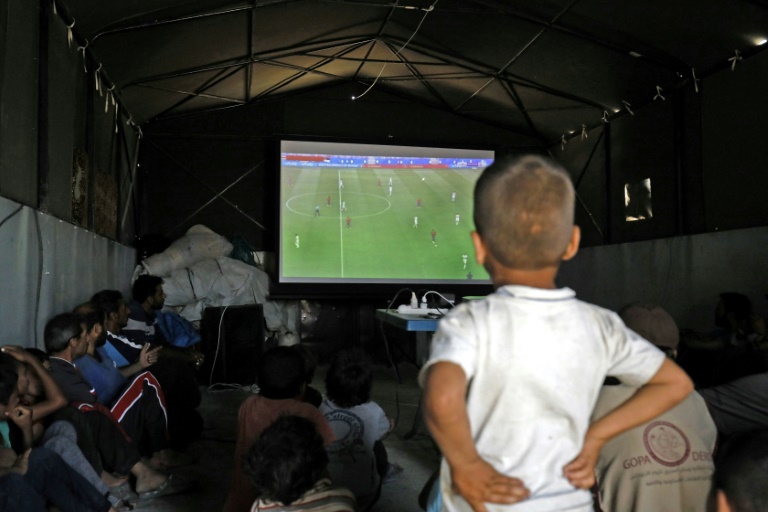Displaced Syrians find relief in tent-side World Cup screenings

At a camp for the displaced in northern Syria, men and boys huddled near a projector to watch some of the world's best footballers play on the side of a tent.
For these soccer enthusiasts uprooted by Syria's seven-year war, World Cup games such as these offer brief respite from their woes and the daily grind at the camp.
Throughout the championship, a local charity is screening all matches for free at the Ain Issa camp for the displaced in the northern province of Raqa.
"Showing the World Cup at the camp is such a beautiful initiative because it draws people out of their torment," spectator Abdallah Fadil al-Ubayd said.
"Everybody loves football," said the 38-year-old, dressed in a red sports T-shirt to watch Mexico play Germany on Sunday.
As the players dashed across the portable screen, the commentator's voice boomed out from loud speakers and across surrounding tent tops.
When Mexico scored, the cheers of dozens of spectators rose up above the camp.
Ubayd used to play for a local team in his hometown of Maskana in the northern province of Aleppo, before jihadists overran it more than four years ago, imposing their rigid interpretation of religion on residents.
"Daesh would come to the matches, confiscate our ID cards and throw the athletes in jail," he said, referring to the Islamic State jihadist group.
- An 'extremely hard' time -
IS swept across large parts of Syria in 2014, declaring a "caliphate" there and in swathes of neighbouring Iraq, but separate offensives have since expelled the group from all major urban centres they once held.
"Thank God we got rid of them and we can watch games again," said Ubayd, whose hometown was retaken by Syrian regime forces in June last year.
He was supporting Egypt, he said, and hoped its star Mohamed Salah would return to the pitch and lead his team to victory on Tuesday.
Syria's war has killed more than 350,000 people and displaced millions since it started in 2011 with the brutal repression of anti-government protests.
Thousands of people who have fled their homes live in the camp in Ain Issa, where the World Cup games are screened outside on the side of a tent in the evening, but inside during the day.
Within the hot tent, children sit by their fathers, gazing up at the figures running on the screen.
Some carry a pillow on which to rest during the game, while others lay a piece of material on the ground to sit on.
Outside, Mubad al-Mohammad, 23, says the World Cup this year comes at a time of his life that is "extremely hard".
The young man has been living in a tent at Ain Issa for more than a year after fleeing his home city of Raqa.
- 'Miss the excitement' -
"It's so hot and we miss our friends, the excitement of watching games," said Mohammad, whose city was under IS rule from 2014 to last year, when a US-backed alliance seized it.
He said he followed the last World Cup from home in Raqa -- even as IS members raided coffee shops showing the games, forcing football fans to go home to pray.
"War has taken away so many good things from us including sport," said the Brazil supporter.
Nearby, Abdallah Abdelbasit, 47, said he was delighted the camp's footballers could follow their teams on the big screen.
Nicknamed Abu Ashraf, the man with a neatly trimmed grey beard and haircut still plays himself and has been active in organising the camp's youth into teams.
The free screenings were very welcome, he said, especially after attending fixtures at a local cafeteria proved to be too expensive for many camp residents.
With three World Cup matches a day, the initiative fills "the void and boredom", allowing spectators to "forget some of their troubles", he said.
But enthusiasm this year is still not the same as for previous championships, said Abdelbasit, who claims he has followed games for the past 30 years.
"Before there used to be great excitement and cheering, but at the camp the spectators don't clap except if a goal is scored."
"The war has affected this generation, depriving it of sport for seven years," he said.
But Abdelbasit remained optimistic for the future.
"We hope to watch the next World Cup in our homes," he said.

World Cup matches are screened inside tents during the day and outside in the evening

The free screenings are welcome as watching in a local cafe proved too expensive for many camp residents
















